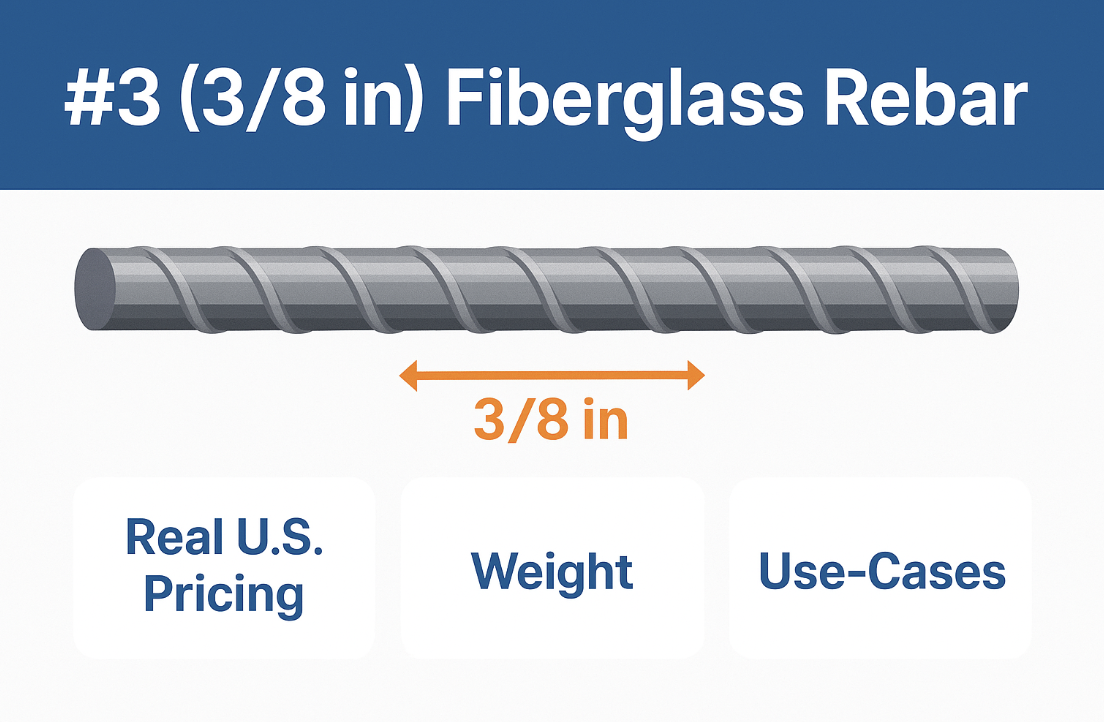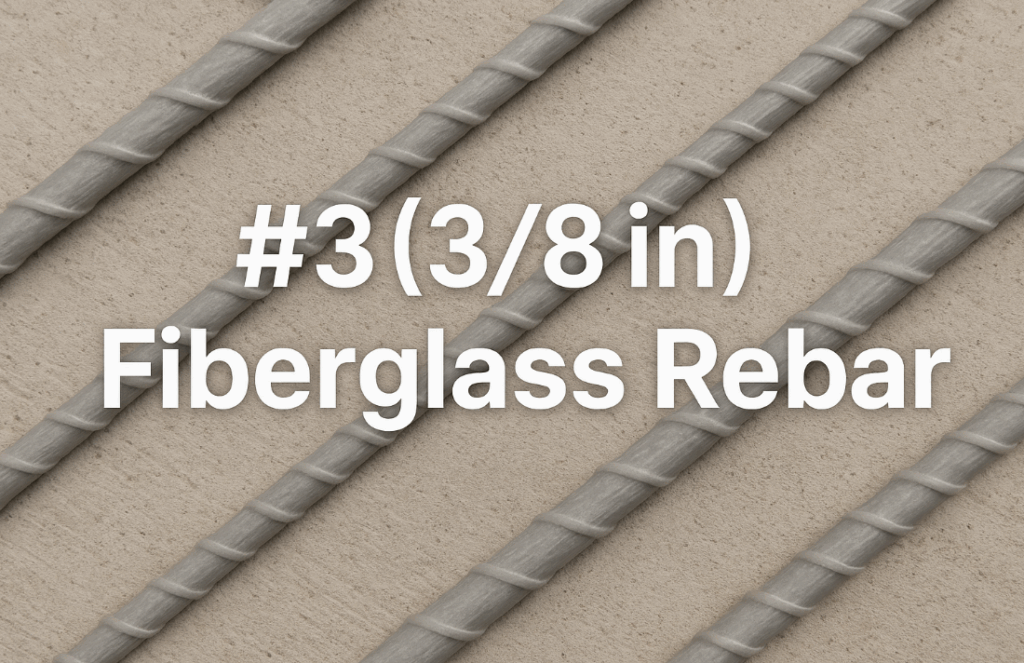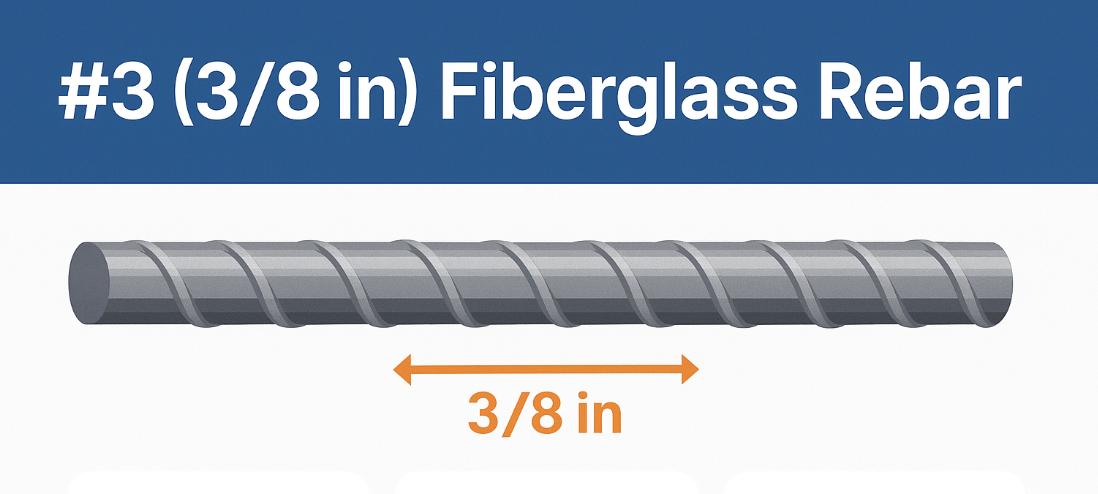In the United States, #3 (3/8 inch) fiberglass rebar has quickly become one of the most requested sizes of Glass-Fiber-Reinforced Polymer (GFRP) reinforcement. It matches the common size of steel #3 bars used in foundations, slabs, driveways, and light structural elements, but brings massive advantages in durability, weight, and lifecycle cost.
Contractors, engineers, and investors searching for terms like “#3 fiberglass rebar,” “3/8 GFRP price,” and “buy fiberglass rebar” want two things: real pricing data and proof of value. This article provides both — plus a deeper look at the profitability of fiberglass rebar production as a business opportunity.
What Is #3 Fiberglass Rebar?
- Nominal size: #3 corresponds to 3/8 inch (9.5–10 mm) diameter.
- Typical length: 10 ft, 20 ft, or custom cut.
- Applications: sidewalks, residential slabs, driveways, retaining walls, pool shells, and lightweight structures.
- Alternative names: fiberglass rebar, composite rebar, GFRP reinforcement.

Unlike steel, GFRP is non-corrosive, non-magnetic, lighter, and stronger in tension. That makes #3 bars ideal for residential, commercial, and infrastructure projects across the U.S.
Real U.S. Pricing for #3 (3/8) Fiberglass Rebar
Based on current distributors, retail suppliers, and direct manufacturer quotes in the U.S., here are realistic market prices:
- Retail price: $0.70 – $0.90 per linear foot (10–20 ft bars sold individually).
- Wholesale price (pallets or full truckload): $0.55 – $0.65 per foot.
- Cost per ton equivalent: ~ $1,800 – $2,200/ton (though weight-based comparison is tricky since GFRP is much lighter).
Comparison with steel #3 rebar:
- Steel #3 bar costs ~$0.40 – $0.60/ft.
- But steel corrodes and requires 2–3x more maintenance over its service life.
- Lifecycle cost of steel is 40–60% higher than fiberglass.
Weight of #3 Fiberglass Rebar
Weight is a critical factor for logistics, installation, and shipping.
- Steel #3 rebar weight: ~0.376 lb/ft.
- Fiberglass #3 rebar weight: ~0.10 lb/ft (approx. 75% lighter).
That means:
- A bundle of 100 steel bars (20 ft each) weighs ~750 lb.
- The same bundle of fiberglass rebar weighs ~190 lb.
This makes transport, handling, and installation dramatically easier and cheaper, especially on large projects or in remote areas.
Key Use-Cases of #3 (3/8 in) Fiberglass Rebar in the U.S.
| Residential Foundations and Slabs | Builders increasingly specify GFRP to eliminate rust in slabs-on-grade, basements, and foundations. |
| Driveways and Sidewalks | Deicing salts rapidly destroy steel. Fiberglass eliminates cracking from rust expansion. |
| Swimming Pools | Pool shells and decks benefit from non-corrosive, non-conductive reinforcement. |
| Marine and Coastal Construction | Boardwalks, retaining walls, and seawalls exposed to saltwater require GFRP durability. |
| Parking Structures | Lightweight #3 bars are used in topping slabs, ramps, and non-structural walls. |
Advantages of #3 Fiberglass Rebar Over Steel
- Corrosion-free: no rust, no spalling concrete.
- Light weight: easier shipping and placement.
- High tensile strength: 2–3x stronger than steel by weight.
- Electromagnetic neutrality: ideal for hospitals, data centers, and laboratories.
- Longer service life: 75–100 years compared to steel’s 30–40 years.
- Lower lifecycle cost: less maintenance, fewer repairs, extended infrastructure lifespan.
Profitability of Fiberglass Rebar Production
Beyond contractors and engineers, many entrepreneurs in the U.S. are looking at fiberglass rebar production as a profitable business.
Production Line Capacity Example
A standard CT-6 GFRP production line (6 rods at once) can produce:
- ~15,000 linear meters of #3 rebar per 8-hour shift.
- That equals ~49,200 ft/day.
Revenue Potential
At an average selling price of $0.75/ft:
- Daily revenue ≈ $36,900.
- Monthly (20 working days) ≈ $738,000.
Costs
- Raw materials (fiberglass roving + resin): ~$0.25/ft.
- Operational costs (labor, utilities, consumables): ~$0.05/ft.
- Total production cost: ~$0.30/ft.
Profit Margin
- Average gross profit per foot: $0.45/ft.
- Monthly gross profit: $443,000 per line.
This shows why investing in a GFRP production line is one of the fastest-growing opportunities in U.S. construction manufacturing.
Steel vs Fiberglass: Lifecycle Cost Analysis
| Factor | Steel #3 Rebar | Fiberglass #3 Rebar |
| Initial Price | $0.40–0.60 / ft | $0.70–0.90 / ft |
| Weight (per ft) | 0.376 lb | 0.10 lb |
| Corrosion Resistance | Poor | Excellent (100%) |
| Service Life | 30–40 years | 75–100 years |
| Maintenance Costs | High | Negligible |
| Lifecycle Cost | High | 40–60% lower |
Buying Options in the U.S.
If you search “buy fiberglass rebar near me”, you’ll find several suppliers — but most sell at retail markup. For contractors, distributors, and infrastructure projects, it is far more profitable to buy directly from manufacturers or invest in in-house production lines.
Composite-Tech provides turnkey equipment for fiberglass rebar and mesh production, training, and certification support, allowing U.S. businesses to capture this rapidly growing market.

Conclusion
#3 (3/8 in) fiberglass rebar is more than just a steel alternative — it is becoming the standard for modern U.S. construction. With real prices between $0.70–$0.90/ft, lightweight handling, and unmatched durability, contractors and DOT projects alike are rapidly adopting GFRP.
For entrepreneurs, the profitability of fiberglass rebar production lines represents a rare opportunity in the construction industry — combining high margins, booming demand, and long-term sustainability.
Whether you want to buy fiberglass rebar or launch your own GFRP production plant, Composite-Tech is the global leader in equipment, technology, and know-how. Contact us today to learn how to be part of the future of reinforcement.
FAQ
What is #3 fiberglass rebar?
It is 3/8 inch diameter GFRP reinforcement bar, equivalent in size to #3 steel rebar, commonly used in slabs, driveways, and foundations.
How much does #3 fiberglass rebar weigh?
Approximately 0.10 lb/ft, which is about 75% lighter than steel.
What is the price of #3 fiberglass rebar in the U.S.?
Retail price ranges $0.70–$0.90/ft, wholesale $0.55–$0.65/ft.
Can fiberglass rebar replace steel in all cases?
Yes, in most structural applications except certain seismic and high-temperature environments. Always follow ACI 440.11-22 guidelines.
Is it profitable to produce fiberglass rebar?
A single production line can generate hundreds of thousands in monthly profit.
Learn more:
- How to Install Fiberglass (GFRP) Rebar in Concrete Slabs
- Composite-Tech and FRP Institute Announce a Strategic Partnership to Redefine Global Standards in FRP Reinforcement Industry
- GFRP Rebar vs Steel: Cost, Strength, and Long-Term Benefits in Modern Construction
- GFRP Rebar vs Steel Rebar: Technical Comparison
- Fiberglass rebar vs Steel (GFRP vs Steel)

